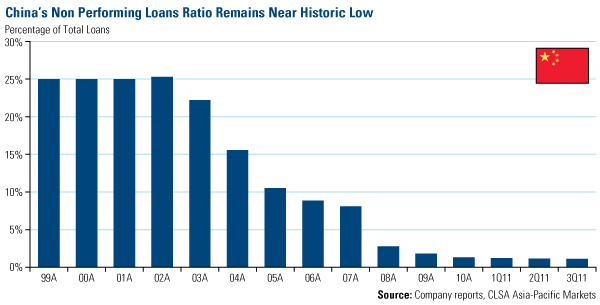Emerging Markets Radar (January 30, 2012)
Strengths
- Despite worldwide economic turmoil, global foreign direct investment (FDI) flows jumped by 17 percent in 2011. This number, however, widely reflects the large number of cross-border mergers and acquisitions. China was the second-largest FDI destination, receiving a record $124 billion. India’s FDI rebounded 38 percent after a big fall in 2010, but remained far behind China.
- Poland’s economy expanded at the quickest pace in three years during 2011, as companies boosted investment and a weakening Polish zloty buoyed exports. The country’s GDP rose 4.3 percent from the previous year, compared with a revised 3.9 percent in 2010.
- With a more favorable policy environment and an end in sight for the industrial destocking process, we anticipate more stable economic growth in China for February after the Chinese New Year celebrations are complete. CEBM concluded in a recent research report that historical experience shows the destocking cycle usually lasts four months and the firm thinks the end of the destocking process is likely to emerge around March.
- Chinese banks listed in Hong Kong are currently cheaper than during the 2008 lows. Banks are currently pricing at 5.4x 2012 price-to-earnings (P/E), 1.1x price-to-book value, and 21.63 percent return on equity, according to JP Morgan’s recent research.
- In China, 22 out of 31 provinces have seen their total GDP surpass Rmb 1 trillion. The Guangdong province leads all of them with Rmb 5.3 trillion. The Shandong province hasn’t reported its 2011 GDP yet, but it is probably the third largest provincial economy in China after Jiangsu province with Rmb 4.8 trillion. Shanghai’s GDP is Rmb 1.9 trillion.
- In 2011, nearly 20 percent of the houses in Hong Kong were bought by people from mainland China.
- In 2011, China became the second-largest global market for Mercedes-Benz and BMW behind the U.S. CEBM reports Mercedes-Benz posted year-over-year sales growth of 32.8 percent during the first three quarters of 2011. This is roughly 25 percent of China’s luxury car market. CAAM expects sales of luxury cars to outperform the overall sedan market in 2012.
Weaknesses
- Bloomberg News reports that the world’s best-performing consumer stocks have become the lowest-rated by analysts after valuations of South African retailers and food producers climbed to the most expensive levels on record. Five companies in the MSCI South Africa Consumer Staples Index, including Shoprite Holdings and Massmart Holdings, are rated the lowest among peers in 36 countries.
- Weekly housing sales transactions in Beijing declined 70 percent from the previous week and 83 percent from the previous year. Although the Chinese New Year was a factor, the trend will continue until the price has dropped to a level that satisfies the government. In China, housing market speculators have been squeezed out of the market in the last two years by tightening policy. Now potential buyers are waiting for a further price drop to get into the market. What the government fears is that if the tightening policy is lifted, the speculators will come back into the market.
- Korea reported forth quarter preliminary GDP growth at 3.4 percent on a yearly basis, lower than the estimate of 3.5 percent. On a quarterly basis, it was up 0.4 percent, weaker than the consensus forecast of 0.5 percent.
- Japan’s December CPI fell 0.2 percent on a yearly basis, and Japan’s core CPI fell 0.3 percent year-over-year for 2011. This shows the Japanese economy is structurally weak.
- Korean manufacturing confidence registered at 81 for February, improving from January’s 79 but still hovering near 30-month lows. Consumer confidence for January came in at 98, dropping 1 point from December’s reading and registering a 10-month low.
- Thailand’s industrial production shrank by 25.8 percent in December, contracting for a fourth month on continuing effects from the flooding.
- Many migrant workers may not come back to the coastal cities after the Lunar New Year since they can just find a job inland locally in China, Zhongguang Web reported in Beijing. A tight labor market will force employers to raise wages and increase their costs.
Opportunities
- HSBC Emerging Markets reports that their key forecasts see China avoiding a hard landing and growing 8.6 percent, Brazil cutting interest rates to 9 percent by midyear, the Czech Republic and Hungary being the only two emerging markets falling into recession, Turkey’s inflation remaining high and monetary policy unorthodox, India’s inflation finally easing, and Russia’s economy growing 3 percent. As emerging markets have started to show signs of an economic slowdown, policymakers have switched back to a reflating mode and we expect them to accelerate their efforts if conditions warrant a more aggressive response.
- Colombia expects about $10 billion in international investment in crude, mining and energy projects this year, the Mines Minster Mauricio Cardenas said this week. Colombia is South America’s third-largest oil producer.
- Poland “deserves a rating upgrade after all the work it has done since 1989” and because growth is bolstering investor confidence, said the CEO of Deutsche Bank’s local unit in Poland. Poland is rated A2 by Moody’s Investor Service, on par with Italy.

Threats
- Argentina has announced that it will extend the list of goods that require a government permit to be imported and will raise import taxes for 100 products to 35 percent from 20 percent, a leading newspaper in the country reports.
- On January 31, Russia will release the country’s fourth quarter GDP data. Analysts at Roubini Global Economics are forecasting that the number will show a meaningful decline from the third quarter’s 4.8 percent year-over-year increase.
- Two major sets of Chinese economic data that can continue to decline in the first half of 2012 are GDP growth and property investment. Before the economy touches its lowest growth rate, the market may have to adapt to a large amount of bad news in the property market, such as sales dry-up and a sharp price fall.









